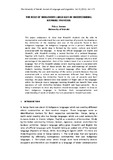| dc.contributor.author | Jerono, Prisca | |
| dc.date.accessioned | 2016-06-02T07:02:21Z | |
| dc.date.available | 2016-06-02T07:02:21Z | |
| dc.date.issued | 2016 | |
| dc.identifier.uri | http://hdl.handle.net/11295/96010 | |
| dc.identifier.uri | https://linguistics.uonbi.ac.ke/basic-page/university-nairobi-journal-linguistics-and-languages | |
| dc.description.abstract | This paper endeavours to show how Kiswahili students can be able to conceptualize and understand the uses and meanings of proverbs by drawing on the similarities of the meanings and uses of the proverbs found in their indigenous languages. An indigenous language carries a person‟s identity and world view. The world view is formed by the norms, culture and beliefs associated with the language. In Kenya the official languages are English and Kiswahili, with Kiswahili carrying a second function of a national language. Together with English, Kiswahili is a compulsory examinable subject in primary and secondary schools in spite of its being an indigenous language only to a small percentage of the population. Most of the students learn it as a second or third language. Part of the Kiswahili syllabus entails learning aspects associated with Kiswahili culture. One of these entails the uses and meanings of proverbs. Students learning Kiswahili as a second language often have difficulties understanding the uses and meanings of the various proverbs because they are associated with a culture and an environment different from theirs. Using examples showing the similarities found in the uses of proverbs and their meanings, the paper demonstrates how speakers of Tugen (one of the languages within the Kalenjin macro language) learning Kiswahili can benefit from some awareness of such similarities between Kiswahili and Tugen proverbs. By so doing it attempts to show why teachers should encourage students to draw on their indigenous languages to facilitate their conceptualization and understanding of words of wisdom that are presented in Kiswahili proverbs. | en_US |
| dc.language.iso | en | en_US |
| dc.publisher | University of Nairobi | en_US |
| dc.rights | Attribution-NonCommercial-NoDerivs 3.0 United States | * |
| dc.rights.uri | http://creativecommons.org/licenses/by-nc-nd/3.0/us/ | * |
| dc.subject | University of Nairobi Journal of Linguistics and Languages | |
| dc.subject | | |
| dc.title | The role of indigenous languages in understanding Kiswahili proverbs | en_US |
| dc.type | Article | en_US |



